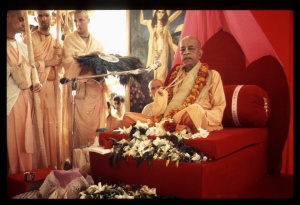SB 10.8.18: Difference between revisions
m (1 revision(s)) |
(Vanibot #0054 edit - transform synonyms into clickable links, which search similar occurrences) |
||
| (One intermediate revision by one other user not shown) | |||
| Line 1: | Line 1: | ||
{{info | {{info | ||
|speaker= | |speaker=Garga Muni | ||
|listener=King Nanda | |listener=King Nanda | ||
}} | }} | ||
[[Category:Srimad-Bhagavatam - Canto 10 Chapter 08]] | |||
[[Category:Bhagavatam Verses Spoken by Gargamuni - Vanisource|100818]] | |||
<div style="float:left">'''[[Srimad-Bhagavatam]] - [[SB 10|Tenth Canto]] - [[SB 10.8: Lord Krsna Shows the Universal Form Within His Mouth|Chapter 8: Lord Kṛṣṇa Shows the Universal Form Within His Mouth]]'''</div> | |||
<div style="float:right">[[File:Go-previous.png|link=SB 10.8.17]] '''[[SB 10.8.17]] - [[SB 10.8.19]]''' [[File:Go-next.png|link=SB 10.8.19]]</div> | |||
{{RandomImage}} | |||
==== TEXT 18 ==== | ==== TEXT 18 ==== | ||
<div | <div class="verse"> | ||
ya etasmin mahā-bhāgāḥ | :ya etasmin mahā-bhāgāḥ | ||
prītiṁ kurvanti mānavāḥ | :prītiṁ kurvanti mānavāḥ | ||
nārayo 'bhibhavanty etān | :nārayo 'bhibhavanty etān | ||
viṣṇu-pakṣān ivāsurāḥ | :viṣṇu-pakṣān ivāsurāḥ | ||
</div> | </div> | ||
| Line 17: | Line 22: | ||
==== SYNONYMS ==== | ==== SYNONYMS ==== | ||
<div | <div class="synonyms"> | ||
''[//vanipedia.org/wiki/Special:VaniSearch?s=ye&tab=syno_o&ds=1 ye]'' — those persons who; ''[//vanipedia.org/wiki/Special:VaniSearch?s=etasmin&tab=syno_o&ds=1 etasmin]'' — unto this child; ''[//vanipedia.org/wiki/Special:VaniSearch?s=mahā&tab=syno_o&ds=1 mahā]-[//vanipedia.org/wiki/Special:VaniSearch?s=bhāgāḥ&tab=syno_o&ds=1 bhāgāḥ]'' — very fortunate; ''[//vanipedia.org/wiki/Special:VaniSearch?s=prītim&tab=syno_o&ds=1 prītim]'' — affection; ''[//vanipedia.org/wiki/Special:VaniSearch?s=kurvanti&tab=syno_o&ds=1 kurvanti]'' — execute; ''[//vanipedia.org/wiki/Special:VaniSearch?s=mānavāḥ&tab=syno_o&ds=1 mānavāḥ]'' — such persons; ''[//vanipedia.org/wiki/Special:VaniSearch?s=na&tab=syno_o&ds=1 na]'' — not; ''[//vanipedia.org/wiki/Special:VaniSearch?s=arayaḥ&tab=syno_o&ds=1 arayaḥ]'' — the enemies; ''[//vanipedia.org/wiki/Special:VaniSearch?s=abhibhavanti&tab=syno_o&ds=1 abhibhavanti]'' — do overcome; ''[//vanipedia.org/wiki/Special:VaniSearch?s=etān&tab=syno_o&ds=1 etān]'' — those who are attached to Kṛṣṇa; ''[//vanipedia.org/wiki/Special:VaniSearch?s=viṣṇu&tab=syno_o&ds=1 viṣṇu]-[//vanipedia.org/wiki/Special:VaniSearch?s=pakṣān&tab=syno_o&ds=1 pakṣān]'' — the demigods, who always have Lord Viṣṇu on their side; ''[//vanipedia.org/wiki/Special:VaniSearch?s=iva&tab=syno_o&ds=1 iva]'' — like; ''[//vanipedia.org/wiki/Special:VaniSearch?s=asurāḥ&tab=syno_o&ds=1 asurāḥ]'' — the demons. | |||
</div> | </div> | ||
| Line 24: | Line 29: | ||
==== TRANSLATION ==== | ==== TRANSLATION ==== | ||
<div | <div class="translation"> | ||
Demons [asuras] cannot harm the demigods, who always have Lord Viṣṇu on their side. Similarly, any person or group attached to Kṛṣṇa is extremely fortunate. Because such persons are very much affectionate toward Kṛṣṇa, they cannot be defeated by demons like the associates of Kaṁsa [or by the internal enemies, the senses]. | Demons [asuras] cannot harm the demigods, who always have Lord Viṣṇu on their side. Similarly, any person or group attached to Kṛṣṇa is extremely fortunate. Because such persons are very much affectionate toward Kṛṣṇa, they cannot be defeated by demons like the associates of Kaṁsa [or by the internal enemies, the senses]. | ||
</div> | </div> | ||
__NOTOC__ | |||
<div style="float:right; clear:both;">[[File:Go-previous.png|link=SB 10.8.17]] '''[[SB 10.8.17]] - [[SB 10.8.19]]''' [[File:Go-next.png|link=SB 10.8.19]]</div> | |||
__NOTOC__ | |||
__NOEDITSECTION__ | |||
Latest revision as of 19:59, 17 February 2024

A.C. Bhaktivedanta Swami Prabhupada
TEXT 18
- ya etasmin mahā-bhāgāḥ
- prītiṁ kurvanti mānavāḥ
- nārayo 'bhibhavanty etān
- viṣṇu-pakṣān ivāsurāḥ
SYNONYMS
ye — those persons who; etasmin — unto this child; mahā-bhāgāḥ — very fortunate; prītim — affection; kurvanti — execute; mānavāḥ — such persons; na — not; arayaḥ — the enemies; abhibhavanti — do overcome; etān — those who are attached to Kṛṣṇa; viṣṇu-pakṣān — the demigods, who always have Lord Viṣṇu on their side; iva — like; asurāḥ — the demons.
TRANSLATION
Demons [asuras] cannot harm the demigods, who always have Lord Viṣṇu on their side. Similarly, any person or group attached to Kṛṣṇa is extremely fortunate. Because such persons are very much affectionate toward Kṛṣṇa, they cannot be defeated by demons like the associates of Kaṁsa [or by the internal enemies, the senses].